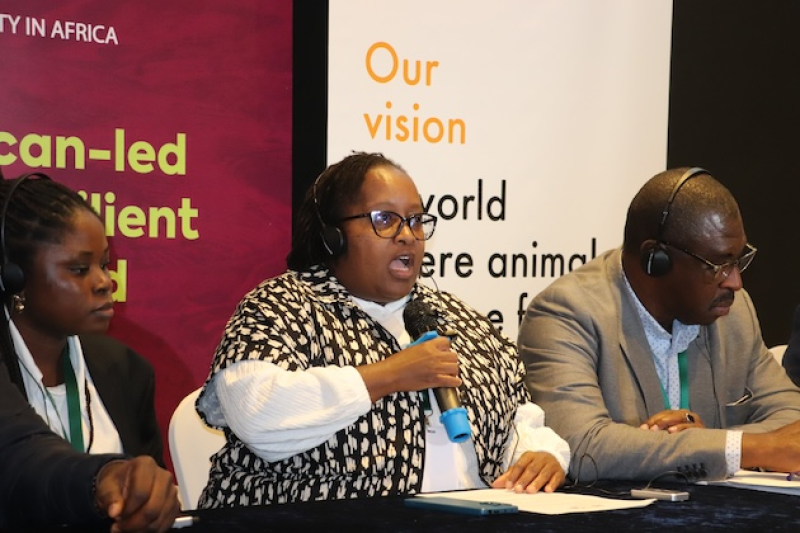- A Day of People-Centered Food System Storytelling! |
- No evidence of postal ballot irregularities found: EC Sanaullah |
- Bangladesh Bank injects Tk 9,178 crore to ease liquidity strain |
- No LPG Shortage Expected During Ramadan: BERC Chairman |
Africa Urges Homegrown Farming in Climate Transition

Ann Maina of BIBA addressing the media at the Africa Climate Summit.
African climate negotiators and civil society organisations at the second Africa Climate Summit (ACS2) have called on governments to include sustainable farming approaches and other Africa-led solutions in their revised Nationally Determined Contributions (NDCs) and National Adaptation Plans (NAPs) ahead of COP30, as the only way to place their priorities on the global climate negotiation agenda.
NDCs are climate action plans submitted to the UNFCCC by individual countries under the Paris Agreement, outlining efforts to reduce greenhouse gas emissions and adapt to climate change. NAPs outline how countries will adapt to climate change in the medium and long term.
“Most of the issues we discuss in the negotiation rooms carry political inclinations and economic implications,” said Dr Antwi-Boasiako Amoah, Lead of Ghana’s delegation at UNFCCC climate negotiation conferences and the incoming Chair for the Africa Group of Negotiators (AGN).
“If we fail to prioritise sustainable farming practices and other innovations through our NDCs and NAPs, developed nations will happily keep the status quo because Africa remains an important market for their farm inputs, particularly fertilisers, pesticides, and fossil fuel-powered machinery,” he said.
Ethiopian Prime Minister Dr Abiy Ahmed backed the call, stressing that Africa must lead in championing its own solutions.
“We are not here to negotiate our survival; we are here to design the world’s next climate economy,” he told delegates at ACS2, ahead of COP30 later this year in Belém, Brazil.
According to Ann Maina of the Biodiversity and Biosafety Association (BIBA), such solutions include advancing food sovereignty by rejecting exploitative industrial animal agriculture, rejecting the heavy use of synthetic fertilisers, resisting the grabbing of Africa’s resources in the name of greening projects, and opposing carbon markets that disadvantage communities while benefiting polluters in the Global North.
“Having Africa-led solutions will encourage a just transition, leading to decentralised energy that powers agroecology, territorial markets, and resilient livelihoods, reducing dependence on imported fossil fuels and exploitative ‘green grabs,’” she said.
“If we make the right choices now, Africa can be the first continent to industrialise without destroying its ecosystems,” reiterated Ethiopia’s Prime Minister.
Evidence-based studies consistently show that the most viable and sustainable farming practice in Africa is the use of agroecological approaches, which emphasise ecological balance, social equity, and cultural integration. These approaches present strategic opportunities to address climate change impacts while supporting sustainable development.
Yet progress has been slow. A recent report by the Alliance for Food Sovereignty in Africa (AFSA) covering all 53 African countries reveals that integration of agroecology into NDCs and NAPs remains alarmingly low, with only 22 per cent of NDCs explicitly mentioning it.
“This study exposes a critical gap in policy integration and calls on all industry players to act with urgency,” said Dr Million Belay, AFSA General Coordinator. “Agroecology is not just a farming method; it is a bold climate solution rooted in African realities, which governments should be promoting instead of subsidising harmful chemical inputs.”
Some farm inputs, particularly pesticides exported to Africa, are banned in their countries of origin due to their negative impact on human health, the environment, and key pollinators.
According to Amoah, recognising agroecology at the UNFCCC level will require up to 50 countries to explicitly include it in their NDCs. “Without a deliberate and united push for sustainable farming approaches in Africa, I foresee serious resistance from developed countries. While these approaches benefit African economies and food systems, they threaten economic and political interests in the Global North,” he said.
The AFSA report shows that incorporating agroecology into NDCs and NAPs supports both adaptation and mitigation goals by enhancing carbon sequestration, reducing greenhouse gas emissions, and fostering climate-resilient farming systems.
So far, Africa has faced a chronic lack of finance to meet adaptation costs. Less than two per cent of global climate finance reaches small-scale actors in the food system.
According to African negotiators, projects that serve the business interests of developed countries are easily approved in negotiation rooms, unlike agroecology approaches, for which negotiators from the Global North often demand excessive evidence to stall progress.
“As advocates of agroecology, we need to be very strategic because negotiations are about consensus building,” said Amoah. “It is one thing to raise a subject and another to convince other parties to accept it.”
African countries are currently updating their NDCs to be submitted to the UNFCCC ahead of COP30. “AFSA is working with individual African countries towards integrating agroecology into their NDCs,” said Belay.

